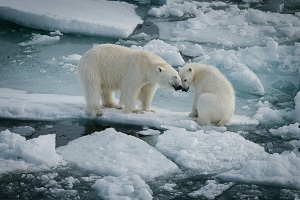Rosneft gathered unique data on polar bear migration

As part of implementation of the program on polar bear migration studies Rosneft has gathered unique data on animal migration. Using a satellite data transmitting collar, which was put on a female polar bear during Kara-Winter-2015 expedition, the Company's specialists tracked her migration route. Satellite mark allowed to determine that in December 2015 the bear occupied a den at one of numerous islands to the north of the Lena river delta, and in the end of March 2016 she left the den and headed north.
Researches were able to locate the den in a region which is hard-to-reach for carrying out field research. Data on birth dens location is a crucial information, needed to design and implement measures aimed at saving polar bears population.
Usage of satellite telemetry produced in Russia allows getting information on speed of moving, distance covered and on "Arctic Lord's" habitat preferences as well as its reaction on environmental changes.
Observing polar bears marked during "Kara-Winter-2015" expedition revealed various migration routes. Some of them travelled long distances while others didn't come too far. The length of individual montly tracks varied from 200 to 1500 km. Areas explored by different individuals during 8 months of survey totaled 100-200 sq. kms. According to scientists, such differences are linked both with individual characteristics of each bear as well as diversity of their habitats.
|
Note for editors: During complex Arctic expeditions of the Company, Rosneft is carring out research of polar bears, using modern technologies. Animals are marked with special collars fitted with satellite transmitters to track their routes, biological samples are taken. The results of immunologic, microbiologic and molecular-genetic research of all biological probes taken allow to evaluate grade and contents of antropogenic substances in polar bears' organisms, to evaluate health state of different age-sex groups in varying habitats and to determine degree of studied individuals relationship. These research is a part of the Company's polar bears support and protection program, which involves fostering animals in zoos all over the country. |
Rosneft Information Division,
May 13, 2016